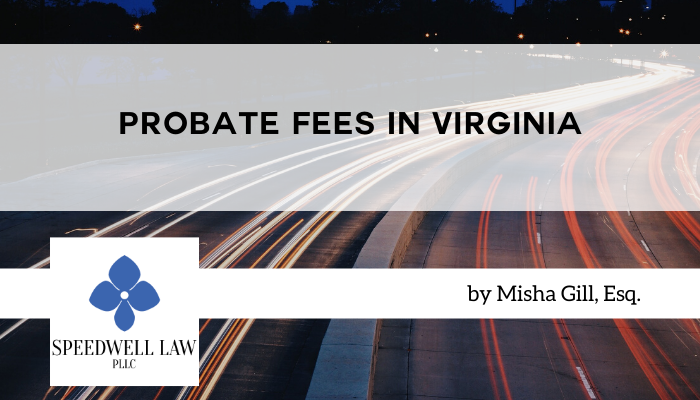
Probate Fees in Virginia
After someone dies, their final debts and taxes must be paid, and their remaining assets must be distributed to their heirs. Probate is the court-supervised process that facilitates this dispensation of a deceased person’s estate.
There are three things you should know about probate in Virginia:
- It can be time-consuming, often taking a year or more to finish;
- It can be expensive; and
- It can be avoided if you have the right documents in place
If you use a Will to distribute your estate after you pass away, your Will must be admitted to probate before it can pass any of your assets on to your heirs and beneficiaries. Furthermore, any assets that you own in your own name at the time of your death will generally need to pass through probate before they can be inherited by your heirs.
Probate Fees
There are a number of different expenses that will typically accumulate during probate. These include:
- Administrative fees
- Court costs
- Legal fees
- Accounting fees
- Publication, Appraisal, and liquidation fees
Fiduciary Fees for Administering the Estate
When you create your will, you name an executor. This person will act in a fiduciary capacity to handle the administrative tasks involved in probating your estate. Unless the will states otherwise, your executor is entitled to compensation for their services. Virginia Code § 64.2-1208 limits fiduciary fees to “reasonable compensation.” For guidance on what the law considers reasonable in Northern Virginia, see Fairfax County’s fiduciary compensation schedule for executors and administrators. Wills can provide more specificity about the fee an executor can take, and if it’s silent then the default fee schedule of the jurisdiction will apply. As of 2022 in Fairfax County, the personal representative’s fee starts at 5% of the first $400,000 of the estate (inventory value) and the rate goes down in increments of a percent thereafter until reaching 2% for assets exceeding $1 million.
Court Costs
In Virginia, the executor must pay a fee to the court to open a probate case. In addition, the state will impose a probate tax based on the estimated value of your estate, which may be accompanied by a local probate tax of one-third of the state probate tax. The probate tax is one-tenth of a percent of the estimated value of the estate.
In addition, in Virginia each court delegates financial supervision of fiduciary matters to a private attorney called the “Commissioner of Accounts.” The Commissioner of Accounts is authorized to receive and review the financial reports of the personal representative of the estate, and to bring court proceedings against personal representatives who fail to perform their duties by furnishing proper reports. The estate pays the Commissioner of Accounts a fee for receiving and examining each financial report, and the fees are on a sliding scale depending on the size of the estate, starting at $660 for an accounting for a small estate and exceeding $2,000 for large estates.
Legal Fees
Because probate is a legal process that takes place under the supervision of the court, your executor will often retain a probate attorney to assist them with the tasks they must perform. The Attorney fees will differ from firm to firm. Some firms bill by the hour; others charge a flat fee. But, regardless of the method, these fees will typically amount to 3-5% of your estate’s value.
Accounting Fees
Your final debts must be paid during the probate process, including your taxes. So, most often, an accountant will be brought in by your executor, and accounting fees will be incurred. You may also hire a professional service to assist you with preparing the financial reports due to the court, called “accountings,” which would incur a separate charge but often end up being a value-add for the speed and accuracy with which they are prepared.
Publication, Appraisal, and Liquidation Fees
Your executor must notify your creditors about the probate proceedings, and, ultimately, the assets that comprise your estate must be prepared for distribution to your heirs. During this process, publication, appraisal and liquidation fees will be incurred.
Avoiding Probate
Probate fees and costs come out of your estate. When you add up all these expenses, you can see that they can consume a noticeable portion of your estate. This is money that could have otherwise gone to your heirs.
The good news, however, is that various estate planning tools can be utilized to minimize or completely avoid probate. One popular option is a revocable living trust.
By avoiding probate, you can save a considerable amount of money for your family. But that is not the only way you save. You can also save time and hassle.
For example, distribution from a revocable living trust can occur almost immediately, which can be very helpful if your loved ones are experiencing financial difficulties after your death. Furthermore, because your family is not constantly worrying about the probate process, they can get on with their lives.
Consult With An Experienced Virginia Estate Planning Attorney
If you would like to learn more about probate fees in Virginia and/or probate avoidance strategies, our law firm can help. We offer a free consultation, and we invite you to contact us to set up an appointment.
Call us at (703) 553-2577 or use the contact form today to schedule an appointment with a qualified and experienced Virginia estate planning attorney.
The information on this site is for general informational purposes only. The information presented in this site is not legal advice or a legal opinion. You should seek the advice of legal counsel of your choice before acting upon any of the information in this site.





